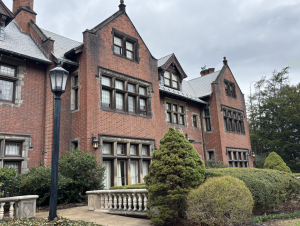Are Chatham’s COVID-19 rules for students conflicting?
October 23, 2020
Students are sometimes being pulled in different directions when it comes to trying to follow Chatham University’s rules regarding COVID-19.
There are strict safety guidelines in place to help prevent the spread of coronavirus cases. But then there also are activities at times set up by the school for students that seem to conflict with the rules that are being enforced.
Orientation activities in August, for example, were cut down considerably from last year. However, some of the activities that were provided created difficult situations in which students had to struggle to follow previously stated protocols.
Students were invited to a petting zoo on the quad during orientation. Reportedly, no social distancing was enforced, and all students were coming in contact with the same animals. While the petting zoo was enjoyable and the number of cases stayed in check, this constitutes an example of Chatham disregarding otherwise strict social distancing rules.
Another reoccurring conflict is the rule regarding wearing masks outside. Students are allowed to congregate on the quad, but some feel as though they’ve been told varying rules on whether or not they have to wear a mask outdoors. Some students have been informed by authority figures that they are not required to wear masks while they are outside. Other times, some say they’ve been yelled at by others on campus when they were outdoors with no mask on.
“I was walking outside alone, and I didn’t have my mask pulled up,” says Maxwell Heller ’23. “My coach told me that we weren’t required to wear masks outside. Then all of the sudden this girl was yelling at me from the quad and telling me to put a mask on even though I was alone. I don’t even think she works on campus. I’m pretty sure she was just a student.”
When are masks not required?
- When alone in an office, workspace, residence hall private room, or apartment
- When outside andcan easily maintain physical distancing of six feet or more
— Chatham University Communications email to students, Aug. 18
Students who participate in outside strength and conditioning classes are not required to wear a mask, and the workout groups come in contact with each other.
Lab partners come in contact with each other in their in-person classes every week, but early in the fall semester they were unable to do homework with each other in the quiet area of their apartments, due to Residence Life’s COVID-19 safety policies. It just seems odd that students were allowed to come in close contact with other students in class, on the quad and off campus, but the line was drawn at visiting each other’s living quarters.
Residence Life eventually relaxed some of its visitor policies to only limit commuter students, students from other schools, family and general outsiders from visiting on-campus housing. Visitor policies were tightened up again, though, in mid October, when the University shifted temporarily to virtual learning when it elevated its operational alert level from “raised” to “high” due to an increase in positive COVID-19 cases.
Furthermore, at the beginning of the academic year, RAs reportedly held large in-person meetings outside wherein all apartment tenants stood together on the quad. Those in attendance said mask-wearing was not enforced.
Not following the University’s COVID-19 protocols is considered a violation of the Honor Code. On the third offense, students can be asked to find housing off campus.
With that in mind, then why did these kinds of group meetings and activities take place in person? And if they were necessary to hold in person, then why weren’t more steps taken to enforce mask wearing and allow for physical distancing? Either of these changes would have helped the University be more consistent in communicating its plans for how to protect students.
A resident in my apartment tower tested positive for COVID-19 and was required to report who they came in close contact with. The list ended up including not only roommates but also people in their in-person classes, sports team and throughout the apartment tower. This was a more extensive procedure than what students understood to be Chatham’s contract-tracing methods.
According to Chatham’s website, a close contact is to be tested for COVID-19 when “the individual who has tested positive will identify people they have come in close contact (within 6 feet for more than 15 minutes) within 48 hours prior to becoming symptomatic.”
When I tested negative, I was still required to quarantine for two weeks in case I developed symptoms or became a carrier. This was a justified precaution, but the school never offered me a second test in order to confirm that I was not positive at the end of my quarantining period.
I do not believe that there is anyone in particular to blame for the struggles or confusion regarding Chatham’s COVID-19 regulations. I do believe that the lack of communication from all parties involved is crippling to both students and the University. There needs to be more transparency from the University and more cooperation from students if people really want Chatham to stay open for the rest of the year.
The students understand that these are odd times. Chatham is doing its best to keep its students safe and allow them to stay on campus for as long as possible. However, the University needs to decide if it wants to fully restrict students from in-person contact or loosen up and let on-campus students interact without excessive consequences.






